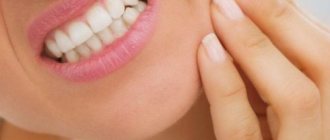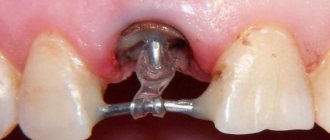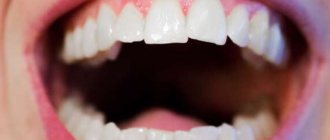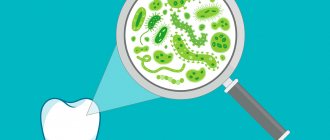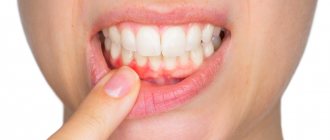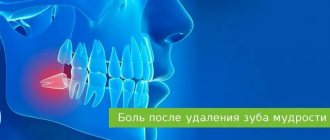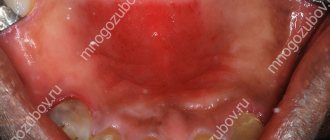Home » All about modern dentistry » Pain management in dentistry » Complications of local injection anesthesia The use of local injection anesthesia can cause complications of a general and local nature. The most common local complications are the occurrence of hematoma and limited movement of the joint, damage to the vessel, breakage of the injection needle, injury to the nerve trunk, ruptures in muscle tissue, swelling and pain after injection, paresis of facial muscles, tissue necrosis, diplopia. Possible general complications are poisoning with anesthetic solution, anaphylaxis and anaphylactic shock.
Headache after visiting the dentist
Visiting the dentist is a very unpleasant experience. Having headaches after visiting the dental office is a common occurrence. If a doctor removes or prescribes treatment for a diseased tooth, a headache may occur.
The reasons for this may be the following:
- Side effect from medications;
- Severe dental disease;
- Poor oral health;
- A large number of teeth undergoing treatment;
- Poor condition of the body as a whole, the presence of chronic diseases;
- Senile age of the patient;
Most often, pain caused by the cessation of the painkiller goes away on its own. If the pain only gets worse, you need to take an analgesic and consult a specialist for advice.
One of the possible causes of headaches may be the removal of a diseased tooth. Headaches occur especially often when a wisdom tooth is removed (the procedure is not always simple). This type of operation tends to damage bone tissue and gums, which leads to pain.
When correcting a malocclusion, headaches often appear. Pain can be of various types:
- Pain in the ear area;
- The occurrence of pain in the temporal part of the head;
- The occurrence of pain in the occipital part;
If you follow clear treatment instructions, this type of headache goes away in a short time.
Migraine knocked on my head...
We all know headaches. The most common type of headache is a migraine. It often appears along with toothache. More recently, scientists have proven that sometimes it is teeth, even healthy ones, that can cause severe migraines.
A headache in itself is not a disease, but it is a symptom that not everything is okay with your physical and sometimes mental state. However, in many cases, despite a thorough examination, no cause for acute headache can be found. Experts say that prolonged attacks of headaches or migraines are a sign that you need to go to the dentist, even if the teeth themselves do not bother you.
Of course, most often the cause of severe headaches, which the vast majority of people suffer from, are injuries to the temporal part of the head. But, in addition, migraine attacks can be associated with inflammatory diseases of the oral cavity, in particular caries. This is due to some deformation of the teeth, causing the upper jaw to be too close to the lower jaw.
The fact is that headaches often occur due to malocclusion. And a huge number of people with crooked teeth are not even aware of their problem. When teeth are positioned incorrectly, pressure is placed on the muscles, nerves and blood vessels located nearby, causing migraine attacks.
As a result of the incorrect position, the temporomandibular joint, the movable connection of the lower jaw with the base of the skull, suffers. At the same time, researchers were able to identify a trend in which people who suffer from temporomandibular joint arthritis are also more likely to have dental problems. Their surfaces are almost constantly in contact, as a result of which severe tension arises in the chewing and facial muscles, accompanied by pain when eating food.
Typically, people experiencing these symptoms are referred to an otolaryngologist or neurologist, but they may also benefit from seeing a physical therapist and dentist. In turn, regular monitoring of the condition of teeth and timely treatment of caries can be one of the most reliable methods of preventing disorders of the temporomandibular joint, as well as most cases of practically untreatable migraine.
Be wary if your head hurts in the morning, if you experience pain behind the eyeballs, in the sinuses, in the neck and shoulders. It is necessary to visit a dentist as soon as possible. Consider having your teeth and gums examined at least twice a year.
Headaches after using anesthesia
Very often, dentists use local anesthesia when treating teeth. After undergoing anesthesia, many patients experience headaches. There are several reasons for this type of pain:
- Presence of intolerance to anesthesia or incorrect choice of medication;
- Location of the diseased tooth in remote places;
Most often, the headache is aching in nature and tends to increase when moving the head.
If headaches began after the extraction of a diseased tooth, it is necessary to find the cause of the pain; it may be a complication of the operation.
Possible complications
Complications after implantation can be early and late, which appear much later than the day when the operation was performed. The latter can appear even after one or two months. The following body reactions are considered absolutely normal: swelling at the intervention site, pain, slight increase in temperature, slight chills, weakness and drowsiness, and the appearance of a hematoma.
To prevent the development of more serious complications, the doctor must adhere to a specific treatment protocol and act in conditions of absolute sterility. The final result of treatment also depends on the patient, so he must follow some recommendations. For example, at first you should not smoke or drink alcoholic beverages. It is also necessary to take medications prescribed by a specialist, this will reduce the risk of inflammation and pain.
After the operation, cold should be applied to the place where the implant was implanted. It is also worth rinsing your mouth with special solutions with an antiseptic effect. It is very important to remember to regularly brush your teeth, floss and rinse after every meal. For a while, it is recommended to give up strong coffee and tea, visiting the sauna and staying in the open sun. During the period of osseointegration, it is extremely important to lead a calm and measured lifestyle, then the likelihood of headaches and other complications will be minimal.
previous post
How long can you walk without a tooth before implantation?
next entry
Headache due to complications arising after dental intervention
Many patients experience headaches after visiting the dentist. Various factors can contribute to the appearance of pain symptoms:
- The appearance of complications that manifested themselves during dental treatment;
- Intolerance and allergic reactions to the use of drugs;
- Contraindications to tooth extraction;
- The appearance of a specific odor in the place of dental treatment;
- The presence of inflammation of the tissues of the oral cavity;
- The presence of swelling of the oral tissues;
Most often, pain occurs in several places. They begin in the jaw and gradually spread throughout the head. Painful sensations can be either sharp or aching. Complications after going to the dentist may depend on the presence of certain diseases in the patient:
- Very often, pain appears in patients suffering from diabetes. The headache may last for a long time;
- Ear disease, which can progress during dental treatment and cause headaches;
- Delay in contacting a specialist, which results in severe diseases of the teeth and gums, which are accompanied by painful symptoms of the head;
After symptoms of complications occur, you must go to the hospital to prescribe effective treatment. The occurrence of headaches may be due to the progression of certain dental diseases. Such as:
- Periodontitis – aching pain occurs in the temporal parts of the head;
- Alveolitis - severe pain occurs that begins in the jaw area;
Back pain
Due to improper functioning of the masticatory muscles, a headache may occur, and the bite may change due to incorrect posture. If there are any disturbances in the correct position of the spinal column, the respiratory system will compensate for them by moving the neck back and turning it. Moreover, the connection between bite and posture works in both directions. That is, an incorrect bite can also cause changes in posture. With an incorrect bite, the first and second cervical vertebrae do not align correctly relative to each other. The body, in attempts to compensate for all this, leads to other disorders. Because of this, in particular, back pain can begin.
Headaches after dental implantation
Pain may occur during the recovery period and after dental implantation surgery. Patients usually experience headaches for several days after surgery. The cause of pain is inflammatory processes in the tissues surrounding the implant. For severe pain, the doctor will prescribe a painkiller. If the pain does not go away within five days, you should contact a specialist who will check the implants for surgical complications and prescribe appropriate treatment.
Causes of pain
It is difficult to recover after implantation; to do this, you should follow many recommendations and advice from the orthodontist, adhere to a special diet and do not forget about careful oral hygiene. Unfortunately, even in this case it is not always possible to protect yourself from the appearance of severe, sudden pain.
Most patients in dental clinics feel it immediately after the anesthesia wears off. An increase in body temperature, general weakness, lack of appetite, etc. may also be noted. This reaction of the body is normal; it is associated with the activation of its protective functions. The headache may last for a week, then it should lessen and go away completely.
Deterioration of the condition may indicate infection in the tissue and the onset of the inflammatory process. The so-called galvanic syndrome occurs due to metal alloys present in the mouth, which produce a galvanic current. It can also be caused by a suddenly onset allergic reaction to the materials used in orthodontic treatment. The pain may be accompanied by nausea, a metallic taste, trouble sleeping, extreme fatigue, etc.
Treatment methods for headaches after dental surgery
If you have a headache for a long time, your dentist will prescribe treatment using the following medications:
- Anti-inflammatory drugs - help relieve inflammation;
- Analgesics – eliminate pain;
- Antispasmodics – relieve spasms that cause pain;
If the cause of pain is inflammatory processes in the oral cavity, then the presence of toxins, which are eliminated by the use of antibiotics, should initially be eliminated, and only then the prescribed medications should be used.
Taking such medications must be done under the supervision of a physician. The use of such drugs is contraindicated for patients suffering from stomach diseases.
Relieving pain with folk remedies
If you experience headaches after a recent visit to the dentist, you must first identify the cause of the disease. It is impossible to do this on your own without visiting a doctor. You can use some traditional medicines, but you should consult your doctor before using them.
- Drinking mint tea is good for eliminating cramps and reducing headaches;
- Freshly prepared viburnum juice - drink one hundred grams for headaches twice a day for five days;
- The use of hot foot baths is a proven folk method for relieving headaches;
You should know that the occurrence of headaches after dental treatment may be one of the first prerequisites for the occurrence of more dangerous diseases. Painful sensations mean that inflammatory processes are occurring in the body, so you need to consult a specialist; you should not self-medicate.
Category Miscellaneous Published by kosmetik-dent


